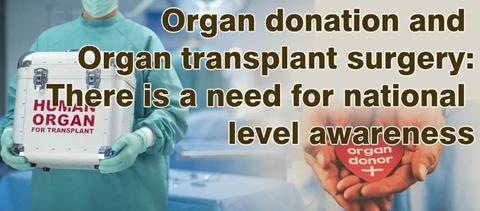Union Health Minister reviews Organ Donation Policy
Organ transplants have increased from 5,000 in 2013 to 15,000 in 2022.
The organ donation and transplant industry is about to undergo visionary structural restructuring. Dr. Mansukh Mandaviya, the Union Health Minister, issued instructions to this effect yesterday while reviewing the state of organ donation and transplantation with senior Health Ministry officials in the presence of Dr. Bharti Pravin Pawar, MOS (Health).
Mansukh Mandaviya, the Union Health Minister, issued instructions to this effect yesterday while reviewing the state of organ donation and transplantation with senior Health Ministry officials in the presence of Dr. Bharti Pravin Pawar, MOS (Health).
India has made significant progress in organ transplantation in recent years. As per the statement, the number of organ transplants has tripled from 5,000 in 2013 to more than 15,000 in 2022.
This growth can be attributed to several factors, including increased awareness about organ donation, improved infrastructure for transplantation, and advancements in medical technology. Additionally, the government has taken steps to streamline the organ transplantation process, such as creating a national organ donation registry and enacting laws to regulate the sector.
Despite this progress, India still faces several challenges in organ transplantation. The country continues to have a shortage of donors, and there are concerns about the ethical implications of organ trafficking and illegal transplantation.
In the 99th episode of the “Man Ki Baat” programme, prime minister Shri Narendra Modi urged his countrymen to support the worthy cause of organ donation to save the lives of their fellow citizens. This has given organ donation in the nation new life. The nation’s overall number of organ transplants has significantly increased from fewer than 5000 transplants in 2013 to more than 15,000 in 2022. Due to improved coordination among the network of Organ & Tissues Transplant Organisations at the National (NOTTO), Regional (ROTTO), and State level (SOTTO), more organs per deceased donor are now being used. For example, in 2016, 2265 organs were used from 930 deceased donors, while 2765 could be used from 904 deceased donors in 2022.
In addition to a Standard Course for the training of Transplant Coordinators, NOTTO is working on a Transplant Manual that will serve as a step-by-step manual for implementing an organ donation and transplantation programme in hospitals. Both of these documents will soon be finished and made available. For better programme implementation, the NOTTO has formed four verticals for coordination: IEC, Training, and HR/accounts. As a special welfare move in the public interest, the Indian government has recently offered Central Government employees Special Casual Leaves of up to 42 days if they donate an organ to another human being.
The Ministry of Health & Family Welfare, overseen by the Union Health Minister, also incorporates lessons from global best practices into future policy changes to boost organ donation and transplantation in the nation.
Overall, while India has made significant strides in organ transplantation, there is still more work to ensure that everyone who needs a transplant can access one safely and ethically.
